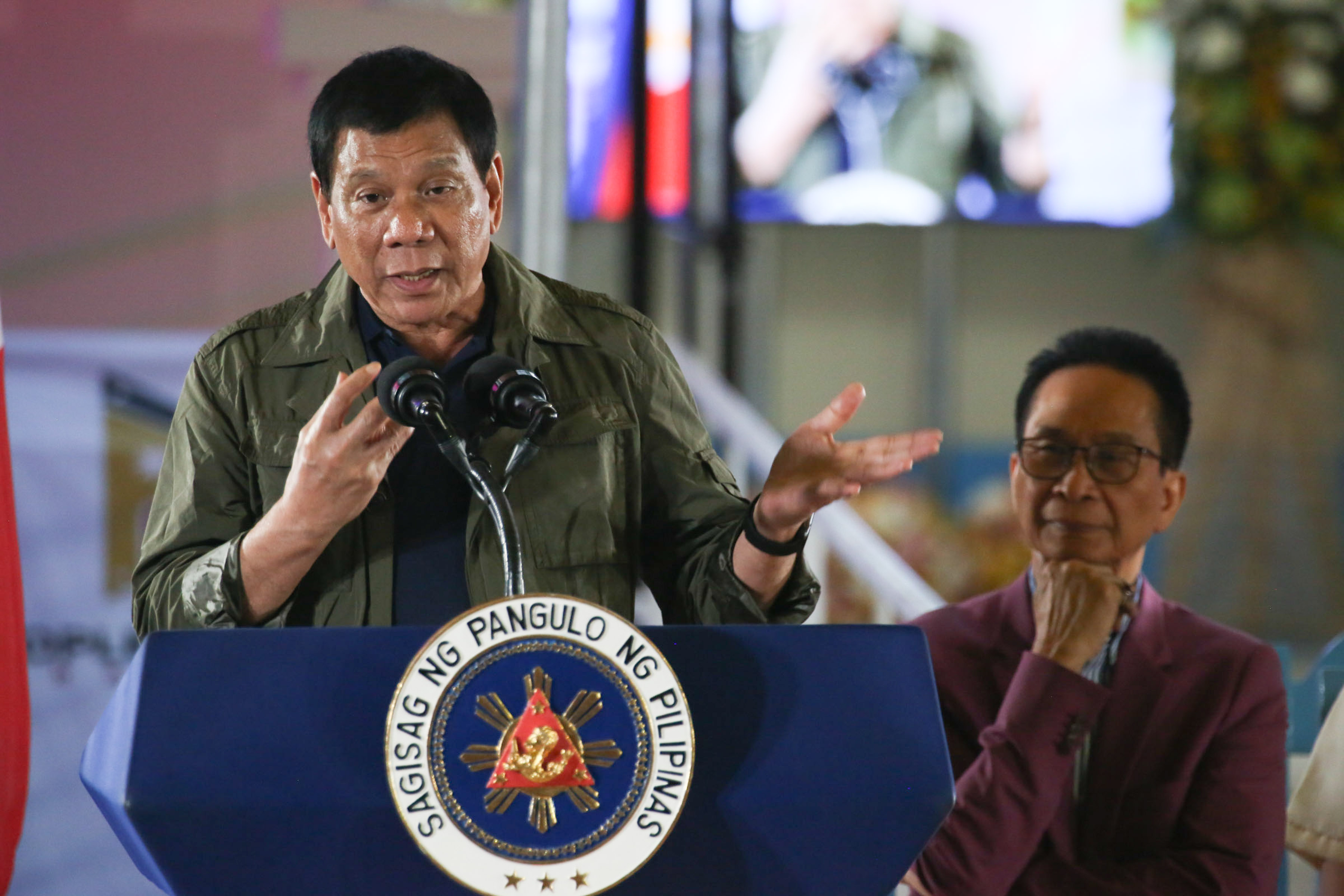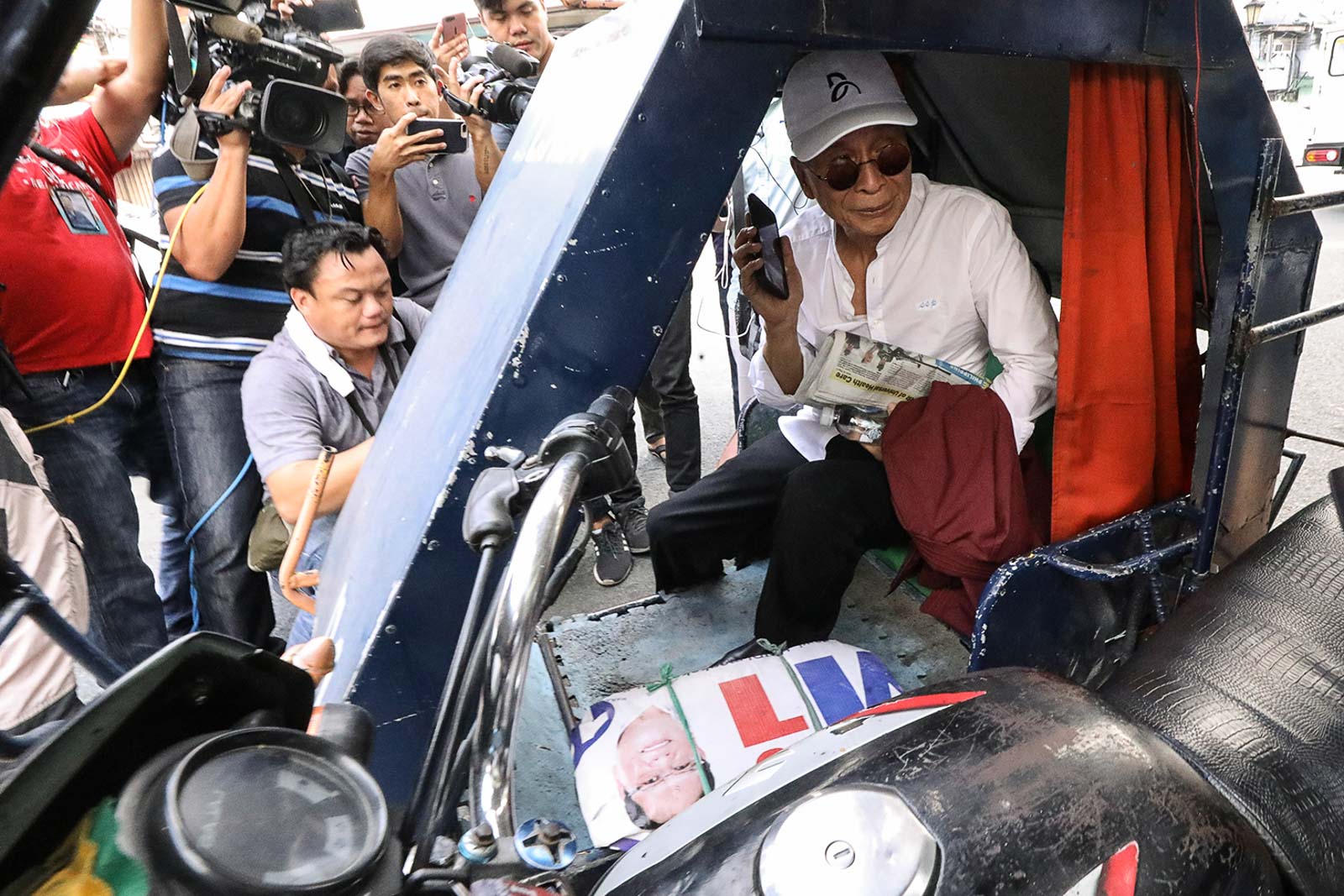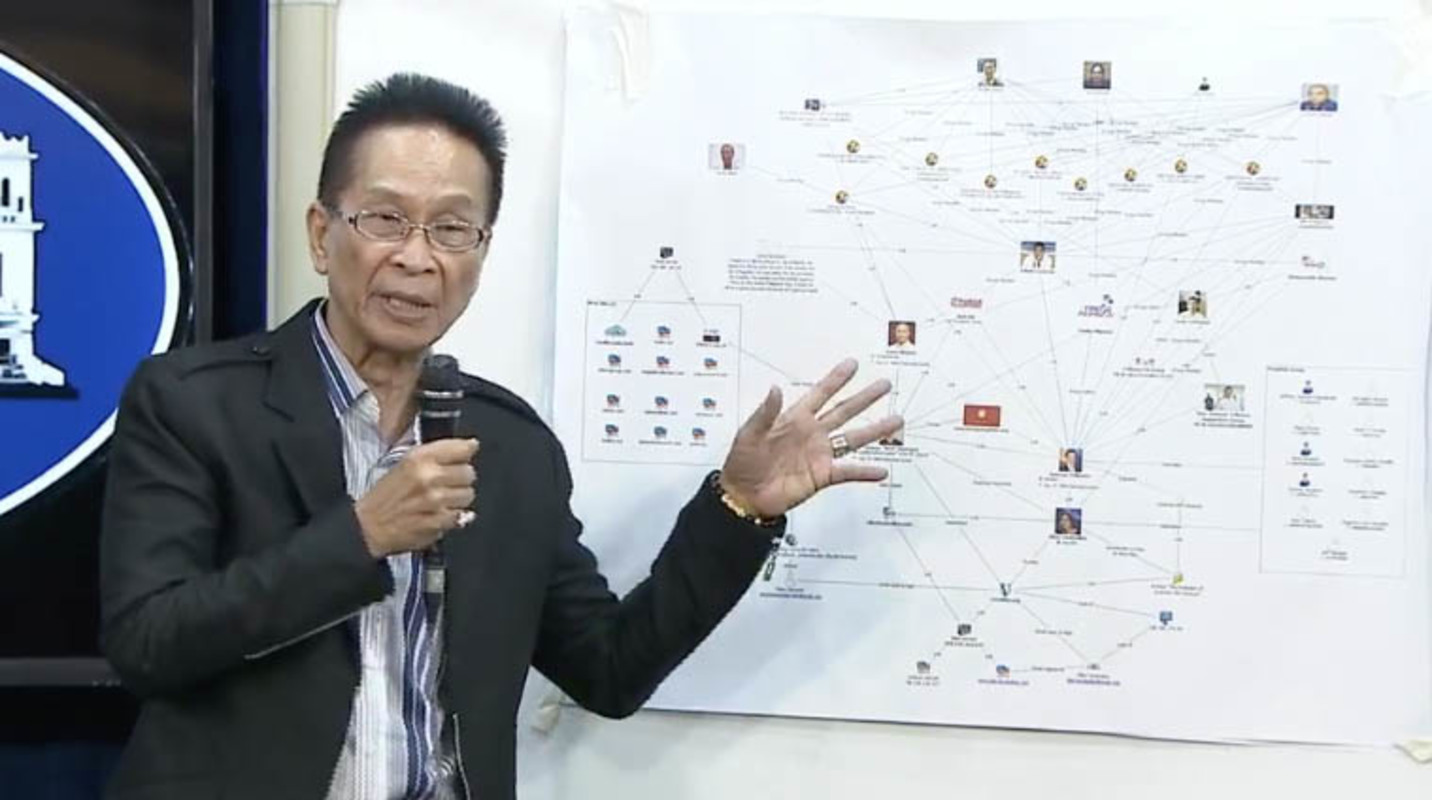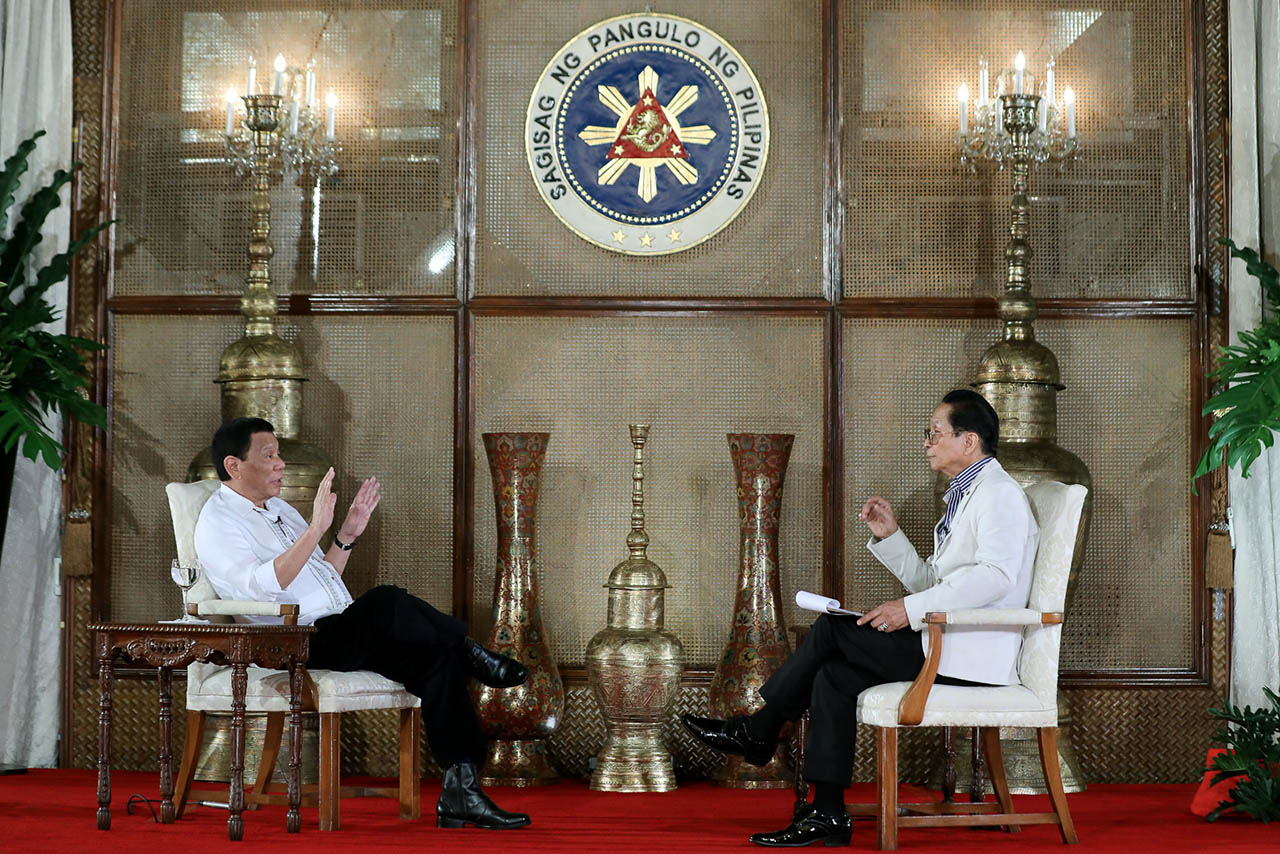SUMMARY
This is AI generated summarization, which may have errors. For context, always refer to the full article.
This compilation was migrated from our archives
Visit the archived version to read the full article.
MANILA, Philippines – Presidential Spokesperson Salvador Panelo always begins his Malacañang press briefings with a smile.
No matter the outrage of the day, Panelo exudes amiability and ease, a buoyancy, missing in the two Duterte spokesmen before him.
“Hello MPC! I’m ready for your questions,” he says with a Cheshire Cat grin.
The lightness in Panelo’s manner is compounded by his now well-known sense of style, described by President Rodrigo Duterte with a chuckle as “sartorial elegance.”
The showman in Panelo razzles and dazzles with his wardrobe of scarves, fuschia suits, fedoras, ripped designer jeans, and leather jackets. A Twitter account @whatsalwore is dedicated to documenting his eclectic fashion choices.
He likes to literally put on a show, like when he belted out “Bakit Ngayon Ka Lang” at a Social Security System event in 2017 and again recently at a business forum. (WATCH: Panelo serenades real estate executives)
But in the one year that Panelo has been Duterte’s chief mouthpiece, controversies have ruffled those peacock feathers and disturbed his carefree demeanor.
He’s come under intense public scrutiny for his dealings with the family of rape-slay convict Antonio Sanchez and his callous remarks on the Metro Manila traffic crisis.
He’s had to rise up to the challenges every Duterte spokesman has faced, proferring his own interpretations of controversial Duterte pronouncements, explaining away the President’s frequent no-shows, and launching attacks on the latest smoldering government critic.
In the year that has passed, Panelo showed us what kind of spokesman he is – the showbiz spokesman, through thick and thin.
The original spokesman
Comparing himself to his predecessors, it’s evident Panelo has carved his own niche.
He shares some traits with former spokesman Harry Roque, but also differs in crucial ways. (READ: The unravelling of Harry Roque)
Roque was aggressive, always ready for battle with a snide remark and an occasional eyeroll. He was primed to spew legal jargon in the face of criticism or pointed questions from the media.
He was good with soundbites and was appreciated by reporters for doing his homework. Roque would proactively take notes during Cabinet meetings or meetings of Duterte with foreign dignitaries. A few times, he even recorded himself giving a verbal report on what transpired during a meeting and sent the audio file to reporters. Roque enjoyed a level of access to Duterte and could occasionally confirm personally with the President on his stance on various issues.
Abella, Roque’s predecessor, was meek in comparison, keeping his statements brief and devoid of character. Only an undersecretary, he lacked the access to Duterte that would give his statements authority. Not a lawyer, he could not tango with reporters questioning the legality of Duterte’s policies and frequently resorted to answers like “No comment” or “I’ll get back to you on that.” (READ: Ernesto Abella, the man who speaks for President Duterte)

ADVISER AND MOUTHPIECE. Presidential Spokesperson and Chief Presidential Legal Counsel Salvador Panelo advises the President on legal matters and speaks for him. Malacañang photo
Panelo is a whole new animal. A lawyer like Roque, in fact concurrently Chief Presidential Legal Counsel, he can call forth and spin legal concepts to defend Duterte, which is how Duterte himself likes to be defended.
He enjoys even greater access to the President, being in his inner circle and even accompanying him to private events.
But what makes Panelo different from Roque is he has absolutely no qualms about how he defends Duterte. Roque had very basic differences with Duterte on issues like the death penalty and press freedom and sought to make a distinction from his personal views and his spokesman’s role.
He tried hard to temper any spin of legal principles (though there were those), no doubt his history in the law academe and human rights legal circles casting a constant shadow. Because he had always been an outsider, he was always conscious of how Duterte supporters would view his public statements. (READ: Harry Roque pirouettes for Duterte)
Roque had something to prove and was constantly walking a tightrope between two sides.
Panelo has no such pretenses and carries no such burden. He is willing to do all sorts of logical gymnastics, go through any number of legal loopholes to put Duterte under a flattering light.
His years as Duterte’s lawyer and friend give him the security that he understands the man well enough and even if he messes up, the President will keep an open line.
In fact, though we talk of Panelo’s predecessors in the formal title of presidential spokesman, Panelo can also be accurately called Duterte’s first spokesman.
During Duterte’s 2016 presidential campaign, it was Panelo whom the then-mayor tapped to fend off accusations by then-senator Antonio Trillanes IV about his hidden wealth.
Cooking under an afternoon sun in a magenta suit and striped tie, Panelo appeared at the Bank of the Philippine Islands (BPI) Julia Vargas branch on May 2, 2016 to ask for proof that Duterte never had P211 million in that particular bank.
For many of the media that covered the event, it was their first encounter with the man Duterte would name weeks later as his presidential spokesman.
After announcing Panelo as his spokesman on May 16, however, Duterte changed his mind, giving the role to ex-pastor Ernesto Abella instead.
No explanation was given for the alteration but, in between, Duterte had been told of Panelo’s awkward remarks to a female reporter.
Yet even with Abella officially taking on the job, and later on Roque, Panelo would relish speaking for the President and giving his take on the hottest issues of the day.
Many a time would reporters be told Panelo was going to the press working area in Malacañang so they could interview him, though no reporter made such a request. He would also often tell reporters to troop upstairs to his office because he wanted to give a statement.
There were even times he would hang out at the press working area, while reporters, busy writing articles on the just-concluded Palace press briefing or presidential event, would be pressured to mind him.
The ultimate affirmation came when Panelo, not even formally spokesman at the time, did a one-on-one interview (or téte-a-téte as the Palace put it) with Duterte at the height of the President’s attempt to invalidate Trillanes’ amnesty.
The one-and-a-half-hour interview, full of pandering questions as expected, nevertheless showed how much the President trusted Panelo when it came to getting his side across.
This love for the limelight was unusual for a chief presidential legal counsel, whose main job is to write legal advisory opinions on policies and issues relevant to the presidency.
Logical cartwheels
But finally, with Roque’s messy departure from Malacañang, Panelo got the post he was destined for.
Since then, the public has been on the frontrow seat of a brand of spokesmanship never before seen, featuring logical cartwheels and amazing feats of overstretch.
“When he (Duterte) says, ‘I will kill you,’ he means, ‘I will pursue you ’til the ends of the earth until you are behind bars,’” said Panelo on September 26.
When critics railed against Duterte’s promise to form his own “death squads” to target criminals, Panelo said citizens should be relieved and appreciative of the gesture. Never mind that the formation of death squads is illegal as he, a lawyer, should know.
“Kung ako yung civilian, matutuwa ako (If I were the civilian, I’d be happy),” he said on November 29.
“We should be relieved that we have a President who is doing everything in his power to stop all acts of criminality, all acts of terrorism against civilians,” he blithely added.
In their September 2018 interview, Panelo joined Duterte in spinning false claims on legal issues hounding his bid to void Trillanes’ amnesty in order to imbue it with legitimacy.
Panelo was among the few Palace officials who agreed to and even encouraged Duterte’s argument that he can withdraw from the International Criminal Court (ICC) because, since the treaty the Philippines signed to join the court was allegedly not published in the Official Gazette, then the Philippines was never a member of the court.
While lawyers inside Malacañang puzzled at the authorship of Duterte’s 15-page “position paper” and distanced themselves from it, Panelo embraced it in ultra-long official statements and media interviews.
And back when Duterte elicited outrage for calling God “stupid,” Panelo’s tact was to first deny the President said such a thing, then argue that the President had made a mere “opinion” and not an “insult” (though the two are not mutually-exclusive). He eventually concluded that Duterte was, in fact, exhibiting the highest form of “spirituality” by dissecting religious doctrine like an “academician.”
Panelo has denied Duterte has ever been “bastos” (rude) to women and advised that if the President’s statement sounds illogical, then he is only joking.
Such all-out defenses of Duterte are classic Panelo. No matter how puzzling, contradictory, even illogical an argument will sound, Panelo offers it to put the President in a flattering light.
Panelo denied his defenses of the President strike some as incredulous and forced.
“Only the detractors like you and Rappler say that. The Duterte supporters and objective people praise me for my explanation,” he told Rappler.
This is what makes Panelo an effective spokesman for Duterte. His years knowing the man have given him insight into the President’s leadership manner and speaking style. But more crucially, Panelo has the flexibility to go along and defend even the seemingly indefensible remarks and decisions of the Chief Executive.
Like his principal, Panelo knows how to put on a show to keep the supporters happy and appeased, no matter the weight of the controversy the government is facing.
Panelo-isms
But spectacles are flimsy.
Another characteristic of Panelo’s time as spokesman is his tendency to make remarks without a solid and rigorous understanding of the issues at hand.
Perhaps the biggest such controversy to blow up in his face was his denial that a Metro Manila transportation crisis exists.
The remark struck many as insensitive and out-of-touch with reality. Any adept PR person would know how touchy an issue traffic is and would be aware of the class divide that energizes it.
Faced with public outrage, all Panelo could do was say he defined “crisis” differently (the mega city’s transportation infrastructure must be in “paralysis” for a crisis situation to exist, he said) and complain he was taken out of context.
He then tried to commute “incognito” to Malacañang, a move panned by many as a diversion.
He was also apparently unaware that Duterte’s suspension of all talks on aid from countries that supported Iceland’s resolution against the drug war included countries that supported it but did not vote for it, like France, Canada, and Germany.

COMMUTE CHALLENGE. Presidential Spokesperson Salvador Panelo commutes to Malacañang, a move panned by critics as a mere stunt. Photo by Darren Langit/Rappler
His lack of knowledge led him to agree with a reporter that French and German aid being negotiated would be exempt from the ban, contradicting the statement of Finance Secretary Sonny Dominguez.
He also erroneously identified a United Kingdom grant as among those affected by the Duterte order.
This was messy messaging from the Philippine government on a policy affecting potentially billions worth of future financial assistance.

One of the biggest Palace spectacles was Panelo’s and Presidential Communications Secretary Martin Andanar’s presentation of an “ouster matrix” naming journalists, lawyers, and opposition figures as conniving to overthrow the President.
Duterte had asked Panelo to explain the “plot” to the public. It is “totally unnecessary” for Duterte to provide more proof of the plot, aside from the diagram, said Panelo, after getting besieged by questions. The matrix turned out to be riddled with errors and inaccuracies.
Other times, Panelo is fond of using assumptions in statements, often qualifying them with the phrase “as far as I know.”
“As far as I know, the President still trusts him,” he said about Health Secretary Francisco Duque III, then battling accusations about government contracts bagged by a firm owned by his family.
“As far as I know, no one is providing us wiretapped information,” he said after Duterte claimed foreign governments were providing information on drug spects.
“As far as I know, there’s none,” he said when asked if there was an impending Cabinet revamp.
There have been many other mishaps under Panelo’s watch, like denying that Duterte vetoed the anti-endo bill only to take it back the next day or denying that Duterte ever ordered the ban on future foreign aid.
But often, these faux pas were because of the greater deficiencies in the communication strategy of Duterte’s Malacañang, one that hounded every spokesman.
Chief of these was Duterte’s own tendency to speak before having a good grasp of the issue, necessitating clarificatory remarks and backtracking from his spokesmen.
There’s also no central vein for announcing many of Duterte’s biggest decisions, like when he fires officials. Often, Panelo or the spokesmen before him are the last to know because Duterte, without informing Panelo, had spoken of his decisions to other people who would leak the information to media.
Hence Palace reporters’ eternal frustration over spokesmen’s responses of “no info on that” or “can’t confirm” or late-to-the-party statements.
But what makes Panelo unique is his complete lack of hesitation to share his personal views on the Palace podium.
He’s given his personal take on the evidence against resigned police chief Oscar Albayalde (drawing the ire of Senator Richard Gordon) and the punishment for Philippine Military Academy officials over the deadly hazing of a cadet.
He’s given his own suggestions on helping emergency patients get to the hospital despite urban traffic (use of military choppers) and even advocated for the proposal of tycoon Ramon Ang to build certain infrastructure.
Ang, whom Panelo called “Don Ramon Ang” had “texted” him his suggestion. Ang heads San Miguel Corporation, a firm vying for big-ticket government transportation projects.
Palace reporters have adjusted, now usually clarifying with Panelo if he was airing his personal opinion or speaking for Malacañang.
Panelo denied he had such a habit. “I do not give my personal opinion. It’s the reporter who insists on [me] giving my opinion. Most of the time, I decline and I tell MPC (Malacañang Press Corps) my opinion on the matter of inquiry is irrelevant,” he told Rappler.
His tendency to overshare has put the Palace in tight spots.
Panelo’s other textmate? Apparently, Chinese Ambassador Zhao Jianhua. So often has Panelo cited his text conversations with Zhao that Senator Panfilo Lacson slammed him for sounding like the “Chinese embassy spokesman” and “lawyering” for China.
This fueled the already rife criticism that Duterte’s Malacañang is subservient to the Asian power which has ignored Philippine sovereign rights in the West Philippine Sea.

‘DIALOGUE.’ A September 2018 interview with Presidential Spokesman Panelo gives President Duterte yet another opportunity to rant against his critics. Malacañang photo
Panelo said Lacson’s jab was an “absurd and silly opinion.” He said he had shared Zhao’s texts to uphold Filipinos’ “constitutional right to information.”
Panelo’s blithe lack of delicadeza has seen him use Palace press conferences as an opportunity to thank a family for hosting him in their Taal heritage mansion and promoting the congressional bid of one of his former staffers, Fidel Nograles, whom he introduced to media.
“By the way, I just saw the future Congressman of Antipolo, Attorney Fidel Nograles. May I acknowledge his presence. Kandidato ito (he’s a candidate). He used to be with the Office of the Chief Presidential Legal Counsel,” he said on January 15, a month before the start of the 2019 campaign period.
Dilemma of delicadeza
Panelo loves to keep things lighthearted, which have led to awkward moments unbecoming of his office, either as presidential spokesman or chief presidential legal counsel.
Back in July, he awkwardly described international human rights lawyer Amal Clooney as “pretty” and “sexy” and a “match” for him. It was recently announced then that Clooney would be joining the legal defense team of Rappler CEO Maria Ressa and reporters sought his reaction.
“Maybe when we meet, to use the word of the President, I can ‘educate’ her,” said Panelo in a July 9 press conference.
Panelo is the same Malacañang official who, in October 2017, told female journalists interviewing him that he “fucks like an 18-year-old” and is “better in bed.” He later on defended his behavior by saying it was just a play on the similarity of the words “fuck” and “pack.”
But Panelo’s behavior with women does not sit well with all Duterte officials. When he brought a group of women to a gathering of Cabinet members, Executive Secretary (ES) Salvador Medialdea would not have it, according to a well-placed source. He told Panelo the women had to leave the event.
Panelo explained that this incident might have been a meeting of Cabinet members and other government officials in a building owned by tycoon Manny Villar on Shaw Boulevard. He denied “bringing” the women.
He said the women involved were “two wealthy female campaign supporters” of Duterte who asked him if they could go inside for a photo opportunity with the President, newly elected only a week ago. Panelo told them they could enter. When they got inside, he offered them some food.
“After a few minutes, ES approached me and asked if I knew the two ladies…ES told me that the informal get-together was only for the new appointees so I told the ES that I’d inform the two ladies,” said the spokesman.
Medialdea has not responded to Rappler’s request for comment.
Panelo likes to bring women to formal events he is invited to. At one event earlier this year hosted by an embassy, he had 3 women with him. One said she worked for a mining company. At one point in the night, another woman kept lightly touching Panelo’s collar.
Panelo’s biggest controversy would be one about delicadeza. On September 3, Bureau of Pardons and Parole officials revealed that Panelo had acted on an application for executive clemency for rape-slay convict Antonio Sanchez, his former client.
Though the BPP eventually denied the Sanchez application, many, including lawmakers, said Panelo’s referral of the matter to the bureau reeked of conflict of interest.
Panelo would later on admit that another of his controversial ex-clients, the Ampatuan family, had reached out to him for help as presidential spokesman and chief presidential legal counsel.
The Sanchez controversy that cost Nicanor Faeldon and other Bureau of Corrections officials their posts did not dent Panelo in Duterte’s eyes. The President even praised Panelo for doing the “right thing.”
A year as Duterte’s spokesman, Panelo is going strong. While the President has toyed with the idea of tapping someone else so Panelo can focus on his role as chief presidential legal counsel, such talk has not been revived. Abella lasted a year and 3 months, Roque one year. Will Panelo outlast them in one of the toughest jobs in the Palace?
With controversy after controversy landing on Malacañang’s doorstep, the spokesman’s show must go on. – Rappler.com
Add a comment
How does this make you feel?
There are no comments yet. Add your comment to start the conversation.